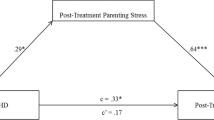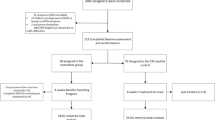Abstract
Improvements in parenting skills do not necessarily lead to improvements in child and parent outcomes for children with attention deficit and hyperactivity disorder (ADHD). Cognitive factors such as parental cognitions and parenting self-efficacy may influence such outcomes. Clinical research on the effects of cognitive-behaviour therapy (CBT) on parental cognitions, parenting self-efficacy and mental health in Chinese parents of children with ADHD is lacking. This quasi-experimental study intended to assess the effects of a culturally attuned group CBT treatment on the mental health and quality of life of Chinese parents aged 26–58 years, with children with ADHD in Hong Kong. Participants in the experimental group received group CBT and standard treatment and their counterparts in the control group received standard treatment. Primary outcome variables of mental health and quality of life and process variables including parenting stress, parenting efficacy and dysfunctional attitudes were measured at baseline, post-treatment and 3-month follow-up. Data were analysed using 2 × 3 ANCOVAs, Cohen’s d statistics and multiple mediation analyses. Group by time interactions were found for most outcome variables. Effect size statistics indicated that group CBT had small to moderate effects on most outcome variables at post-treatment and follow-up assessments. The effect of CBT on mental health was mediated by the reduction in parenting stress and the effect of CBT on quality of life was mediated by the reductions in parenting stress and dysfunctional attitudes. Given its potential benefit, it is worth considering incorporating this group CBT programme into interventions for Chinese parents with ADHD children.

Similar content being viewed by others
References
Abidin, R. R. (1983). Parenting stress index. Virginia: Paediatric Psychology Press.
Au, A., Lau, K. M., Wong, A. H. C., Lam, C., Leung, C., Lau, J., & Lee, Y. K. (2014). The efficacy of a group Triple P (positive parenting program) for Chinese parents with a child diagnosed with ADHD in Hong Kong: a pilot randomized controlled study. Australian Psychologist, 49, 151–162.
Barkley, R. A. (2005). Attention deficit hyperactivity disorder: A handbook for diagnosis and treatment. New York, NY: Guilford.
Beck, J. S. (2011). Cognitive therapy: Basics and beyond. New York, NY: Guilford.
Beck, A. T., Brown, G., Steer, R. A., & Weissman, A. N. (1991). Factor analysis of the Dysfunctional Attitude Scale in a clinical population. Psychological Assessment, 3, 478–483.
Boey, K. W., & Chiu, H. F. K. (1998). Assessing psychological well-being of the old-old: A comparative study of GDS-15 and GHQ-12. Clinical Gerontologist, 19, 65–75.
Cedar, B., & Levant, R. F. (1990). A meta-analysis of the effects of parent effectiveness training. The American Journal of Family Therapy, 18, 373–384.
Chronis, A. M., Gamble, S. A., Roberts, G. E., & Pelham, W. E. (2006). Cognitive-behavioral depression treatment for mothers of children with attention-deficit/hyperactivity disorder. Behavior Therapy, 37, 143–158.
Chronis-Tuscano, A., O’Brien, K. A., Johnston, C., Jones, H. A., Clarke, T. L., Raggi, V. L., & Seymour, K. E. (2011). The relation between maternal ADHD symptoms & improvement in child behavior following brief behavioral parent training is mediated by change in negative parenting. Journal of Abnormal Child Psychology, 39, 1047–1057.
Cohen, J. (1988). Statistical power analysis for the behavioral sciences. Hillsdale, N.J: Lawrence Earlbaum Associates.
Endicott, J., Nee, J., Harrison, W., & Blumenthal, R. (1993). Quality of life enjoyment and satisfaction questionnaire: A new measure. Psychopharmacology Bulletin, 29, 321–326.
Fabiano, G. A., Pelham, W. E., Coles, E. K., Gnagy, E. M., Chronis-Tuscano, A., & O’Connor, B. C. (2009). A meta-analysis of behavioral treatments for attention-deficit/hyperactivity disorder. Clinical Psychology Review, 29, 129–140.
Gau, S. (2007). Parental and family factors for attention-deficit hyperactivity disorder in Taiwanese children. Australian and New Zealand Journal of Psychiatry, 41, 688–696.
Gibaud-Wallston, J., & Wandersman, L. P. (1978). Development and utility of the Parenting Sense of Competence Scale. Paper presented at the meeting of the American Psychological Association, Toronto, Canada.
Ha, E. H., & Oh, K. J. (2006). Effects of cognitive-behavioural group therapy for depression mothers of children with behavioural problems. Child and Family Behavior Therapy, 28, 1–13.
Harold, G. T., Leve, L. D., Barrett, D., Elam, K., Neiderhiser, J. M., Natsuaki, M. N., & Thapar, A. (2013). Biological and rearing mother influences on child ADHD symptoms: Revisiting the developmental interface between nature and nature. Journal of Child Psychology and Child Psychiatry and Allied Disciplines, 54, 1038–1046.
Heath, C. L., Curtis, D. F., Fan, W., & McPherson, R. (2015). The association between parenting stress, parenting self-efficacy, and the clinical significance of child ADHD symptom change following behavior therapy. Child Psychiatry and Human Development, 46, 118–129.
Herschell, A. D., Calzada, E. J., Eyberg, S. M., & McNeil, C. B. (2002). Parent-child interaction therapy: New directions in research. Cognitive and Behavioral Practice, 9, 9–16.
Hoeymans, N., Garssen, A. A., Westert, G. P., & Verhaak, P. F. M. (2004). Measuring mental health of the Dutch population: A comparison of GHQ-12 and the MHI-5. Health Quality Life Outcomes, 2, 23.
Howell, D. (2013). Statistical methods for psychology (8th ed.). Belmont, CA: Wadsworth.
Huang, H. L., Chao, C. C., Tu, C. C., & Yang, P. C. (2003). Behavioral parent training for Taiwanese parents of children with attention-deficit/hyperactivity disorder. Psychiatry and Clinical Neurosciences, 57, 275–281.
Johnston, C., & Ohan, J. L. (2005). The importance of parental attributions in families of children with attention-deficit/hyperactivity and disruptive behavior disorders. Clinical Child and Family Psychology Review, 8, 167–182.
Kraemer, H. C., Stice, E., Kazdin, A., Offord, D., & Kupfer, D. (2001). How do risk factors work together? Mediators, moderators, and independent, overlapping, and proxy risk factors. American Journal of Psychiatry, 158, 848–856.
Lam, A. K. S., & Ho, T. P. (2010). Early adolescent outcome of attention-deficit hyperactivity disorder in a Chinese population: 5-year follow-up study. Hong Kong Medicine Journal, 16, 257–264.
Lee, L. C., Harrington, R. A., Louie, B. B., & Newschaffer, C. J. (2008). Children with autism: Quality of life and parental concerns. Journal of Autism and Developmental Disorders, 38, 1147–1160.
Lee, P., Niew, W. I., Yang, H. J., Chen, V. V., & Lin, K. C. (2012). A meta-analysis of behavioral parent training for children with attention deficit hyperactivity disorder. Research in Developmental Disabilities, 33, 2040–2049.
Leung, P. W., Hung, S. F., Ho, T. P., Lee, C. C., Liu, W. S., Tang, C. P., & Kwong, S. L. (2008). Prevalence of DSM-IV disorders in Chinese adolescents and the effects of an impairment criterion: A pilot community study. European Child & Adolescent Psychiatry, 17, 452–461.
Lin, Y. N. (2002). The application of cognitive-behavioral therapy to counseling Chinese. American Journal of Psychotherapy, 56, 48–56.
Lundahl, B., Risser, H. J., & Lovejoy, M. C. (2006). A meta-analysis of parent training: Moderators and follow-up effects. Clinical Psychology Review, 26, 86–104.
Mah, J. W. T., & Johnston, C. (2007). Cultural variations in mothers’ attributions: Influence of child attention-deficit/hyperactivity disorder. Child Psychiatry and Human Development, 38, 135–153.
Matos, M., Bauermeister, J. J., & Bernal, G. (2009). Parent-child interaction therapy for Puerto Rican preschool children with ADHD and behavior problems: A pilot efficacy study. Family Process, 48, 232–252.
Ngai, F. W., Chan, S. W., & Holroyd, E. (2007). Translation and validation of a Chinese version of the parenting sense of competence scale in Chinese mothers. Nursing Research, 56, 348–354.
Ngai, F. W., Wong, P. W. C., Chung, K. F., & Leung, K. Y. (2016). The effect of telephone-based cognitive-behavioural therapy on parenting stress: A randomised controlled trial. Journal of Psychosomatic Research, 86, 34–38.
Preacher, K. J., & Hayes, A. F. (2008). Asymptotic and resampling strategies for assessing and comparing indirect effects in multiple mediator models. Behavior Research Methods, 40, 879–891.
Primack, B. A., Hendricks, K. M., Longacre, M. R., Adachi-Mejia, A. M., Weiss, J. E., Titus, L. J., Beach, M. L., & Dalton, M. A. (2012). Parental efficacy and child behavior in a community sample of children with and without attention-deficit hyperactive disorder (ADHD). Attention Deficit Hyperactivity Disorders, 4, 189–197.
Singer, G. H. S., Ethridge, B. L., & Aldana, S. I. (2007). Primary and secondary effects of parenting stress management intervention for parents of children with developmental disabilities: a meta-analysis. Mental Retardation and Developmental Disabilities Research Reviews, 13, 357–369.
Spencer, M. B., & McLloyd, V. C. (Eds.) (1990). Minority children (special issue). Child Development, 36, 263–589.
Tam, K. K., Chan, Y. C., & Wong, C. K. M. (1994). Validation of the parenting stress index among Chinese mothers in Hong Kong. Journal of Community Psychology, 22(3), 211–223.
Theule, J., Wiener, J., Rogers, M. A., & Marton, I. (2011). Predicting parenting stress in families of children with ADHD: Parent and contextual factors. Journal of Child and Family Studies, 20, 640–647.
Theule, J., Wiener, J., Rannock, R., & Jenkins, J. M. (2013). Parenting stress in families of children with ADHD: a meta-analysis. Journal of Emotional and Behavioral Disorders, 21, 3–17.
Weissman, A.N., & Beck, A.T. (1978, March). Development and validation of the Dysfunctional Attitude Scale: a preliminary investigation. Paper presented at the meeting of the Association for the Advancement of Behavior Therapy, Chicago, IL.
Wiener, J., Biondic, D., Grimbos, T., Herbert, M. (2015). Parenting stress of parents of adolescents with attention-deficit hyperactivity disorder. Journal of Abnormal Child Psychology, 1-17, https://doi.org/10.1007/s10802-015-0050-7.
Whalen, C. K., Jamner, L. D., Henker, B., Delfino, R. J., & Lozano, J. M. (2002). The ADHD spectrum and everyday life: experience sampling of adolescent moods, activities, smoking and drinking. Society for Research in Child Development, 73, 209–227.
Wong, F. K., & Poon, A. (2010). Cognitive behavioural group treatment for Chinese parents with children with developmental disabilities in Melbourne, Australia: an efficacy study. Australian and New Zealand Journal of Psychiatry, 44, 742–749.
Wong, D. F., Poon, A., & Kwok, Y. C. L. (2011). The maintenance effect of cognitive-behavioural treatment groups for the Chinese parents of children with intellectual disabilities in Melbourne, Australia: a 6-month follow-up study. Journal of Intellectual Disability Research, 55, 1043–1053.
Xiang, Y. T., Luk, E. S. L., & Lai, K. Y. C. (2009). Quality of life in parents of children with attention-deficit hyperactivity disorder in Hong Kong. Australian and New Zealand Journal of Psychiatry, 43, 731–738.
Funding
This project was funded by both the Hong Kong Lutheran Social Service and the Social Welfare Development Fund of the HKSAR Government.
Author contributions
D.F.K.W.: designed the study and wrote and revised the paper, T.K.N.: analysed the data and revised the paper, P.S.Y.I.: analysed the data and wrote part of the initial draft of the paper. M.L.C. and J.C.: conducted the intervention and collected the data.
Author information
Authors and Affiliations
Corresponding author
Ethics declarations
Conflict of Interest
The authors declare that they have no competing interests.
Ethical Approval
All procedures performed in studies involving human participants were in accordance with the ethical standards of the institutional and/or national research committee and with the 1964 Helsinki Declaration and its later amendments or comparable ethical standards.
Informed Consent
Informed consent was obtained from all individual participants included in the study.
Additional information
Data
The research data are available from the website of University of Hong Kong (http://www.rss.hku.hk/integrity/research-data-records-management).
Rights and permissions
About this article
Cite this article
Wong, D.F.K., Ng, T.K., Ip, P.S.Y. et al. Evaluating the Effectiveness of a Group CBT for Parents of ADHD Children. J Child Fam Stud 27, 227–239 (2018). https://doi.org/10.1007/s10826-017-0868-4
Published:
Issue Date:
DOI: https://doi.org/10.1007/s10826-017-0868-4




